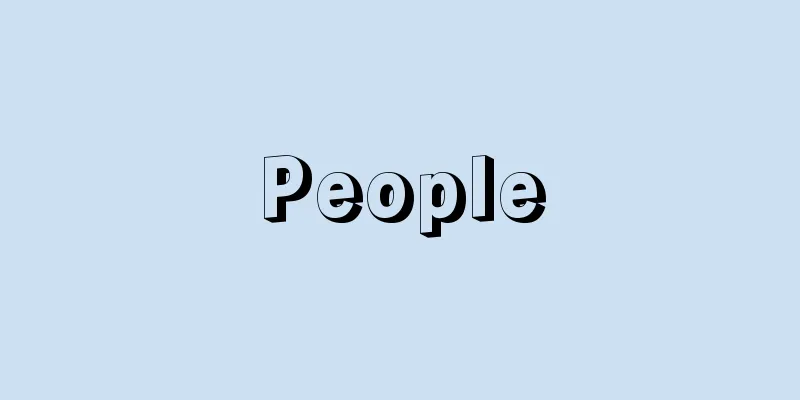People

〘Noun〙[一]① Humans as a type of living organism. They walk upright with their lower limbs, while their upper limbs function as hands, live on land, use tools, and, due to the remarkable development of the cerebrum, acquire the abilities of language, thought, reason, and cultural creation. Humans. Biologically, they are classified as members of the phylum Vertebrate, class Mammalia, order Primates, family Hominidae. The stages of human evolution are generally considered to be ape-men, early man, archaic man, and modern man, and these fossil humans are divided into several genera, but all modern humans are one genus and one species, namely Homo sapiens, and in the narrow sense this is called "hito". The races of modern humans correspond to biological subspecies or variants. Outside of the subject of natural science, "hito" is often used as a concept on the same level as animals and plants, or as a concept opposed to nature. ※Kojiki (712), middle part, folk song: "If there was a single pine tree among the people, I would put on my sword and clothe myself." ※Tsurezuregusa (around 1331), 7: "Of all living things, only humans have lived so long." ② A creature other than human beings that is thought to have a body shape or abilities similar to those of humans. Heavenly beings, Martians, etc., inferred from humans. ※The Bamboo Cutter (late 9th century - early 10th century): "They are people from the capital of the moon." [2] Humans who exist socially. ① Humans as subjects of existence, actions, thoughts, or qualities and states. Individuals or groups of such. ※Kojiki ( 712 ), middle part, folk song: "At Omuraya in Shinobuzaka, many people come and stay." ※Maihime (1890), <Mori Ogai>: "How can a person with a heart look like?" ② Humans as abstract concepts, not concrete beings. (a) Humans in general. What it means to be human. ※Man'yoshu (late 8th century) 4.598 "Even in love , such a person dies, Down by the Minase River, in the thin moonlight." (Ro) When accompanied by the case particle "no," it becomes a attributive modifier, and indicates that the subject to which something belongs is an ordinary human being. It is often used as an idiomatic phrase, and only adds a very light meaning. ※Shoki (720), Kamiyo no Shita (Tanzuru Honin) "How can a human being, as an older brother , serve his younger brother?" ③ People of the world. Ordinary people. Also, society. Secular. ※Shoki (720), Nintoku 43rd year, September (Maeda Honin) "The common people of Baekje call this bird Kuchi." ④ People. Citizens. Green grass. Grass. Tamikusa. ※Man'yoshu (late 8th century) 19:4254 " He did not threaten the country where he lived, nor the people on all sides, and he blessed them with grace."⑤ A person who has all the necessary qualities to be a human being, or in a certain matter. A perfect personality. A fully-fledged human being. (a) One who has reached adulthood. An adult. (b) A person who is human-like. A person worthy of special mention. A fine person. Also, a person who is appropriate in a particular matter. A suitable person. A superior person. A talented person. ※Man'yoshu (late 8th century) 5:892 "I boasted that no one would be able to leave him behind, but it was cold." ※Gukansho (1220) 7 "Among their descendants, there is not a single person with the ability to be considered a human being."⑥ Refers to an important condition for being a human being. (a) Human dignity. Personality. Character. ※Genji (around 1001-14), Haogi: "He is superior to others, and it seems that there is a reason for his sincere feelings." (Ro) A person's social status, family background. ※Murasaki Shikibu Diary (around 1010?), Kanko 5th year, November 17th, "Compared to other people, he is always lagging behind in years to come." ※Genji (around 1001-14), Yugao: "He is not of lowly origins, and although he is arrogant, he is pure." (Ha) Human nature. Character. Refers especially to temperament and mindset. "He is a good person" "He is a bad person." ※Taijou tahan (1896), <Ozaki Koyo>, Mae: " I never thought you were such a dishonest person." ⑦ To the person in question, someone other than him. Other people. (I) Other people. Unspecified people other than the person in question. Also, to the person involved, the people around them. ※Kojiki (712), Vol. 2 , Popular Song: " If the young lady of Karu, flying to heaven, cries bitterly, the people will know." ※Tower of London (1905), Natsume Soseki: "Someone once invited me, but I refused." (B) and others. Others. Others. Used without specifically thinking of a person. ※Tales of Ise (early 10th century), Vol. 4, "I felt sorrowful that she had gone to another person's country, and so I parted ways." ⑧ In law. (B) In a broad sense, a legal personality that includes natural persons and corporations. A person who is the subject of rights and obligations. ※Criminal Law (1880), Article 424: "A person who destroys or destroys documents related to the rights and obligations of a person." (B) In a narrow sense, a natural person in comparison to a corporation. An individual from birth to death. ※Penal Code (1880), Article 292: "Anyone who premeditates the murder of another shall be guilty of premeditated murder and shall be punished with the death penalty." [3] To describe a certain person or a certain type of human being in a generalized or objective manner. ① Refers to an unspecified person. A certain person. Someone. There are cases where a specific person is deliberately referred to in an unspecified and vague manner. ※Man'yoshu (late 8th century) 2.210: "When someone said, 'On the mountain of Otori -no-Hagai, there is a sister whom I love.'" ※Tales of Ise (early 10th century) 48: "I was waiting for him to send off my horse, but he did not come." ② Refers to a specific person who has already been mentioned in a general and vague manner. This person. That person. ※Kokin (905-914), Taki Tabi, 407: "Tell people that you have rowed out across the eighty islands of the cotton plains, your fishing boat (Ono no Takamura)" ③ Objectifying oneself. In modern language, it is often used to criticize the attitude of others towards oneself, such as "making fun of others" or "not even considering other people's feelings". ※Man'yoshu (late 8th century), 4, 562: "I have no time to make people's brows turn in vain, but perhaps she is my sister whom I have never met" ④ Refers to one's opponent. Also, in love stories between men and women, it is used to objectify the other person. You. ※Kokin (905-914), Spring 1, 42: "People do not know their true feelings, but in their hometown, the flowers smell of the past. (Ki no Tsurayuki)" ※Genji (around 1001-14), Usugumo: "He had dug up the autumn grass and moved it, and wanted to make the insects of the field live there so that people could see them." ⑤ It refers to one of the people in various relative relationships. (a) Lover. Also, husband or wife. ※Man'yoshu (late 8th century), 3, 451: "A deserted and empty house was more painful than a journey to Kusamakura." (b) Those who obey or are used by a lord or master. Subordinate, retainer, wife, attendant, servant, etc. ※Kokin (905-914), Kana preface: "I thought of you and others, attached to the crane and turtle." (c) Messenger. Agent. ※Tales of Ise (before the 10th century) 96 "If you wake up someone from there, do this" (ni) Guest. "There were people there all day long."Tari [person]nin [person]Ri [person]and [people]Source: The Selected Edition of the Japanese Language Dictionary About the Selected Edition of the Japanese Language Dictionary Information |
〘名〙[一]① 生物中の一類としての人間。下肢で直立歩行し、上肢は手の機能を果たすようになり、地上生活を営み、道具を使用し、さらに大脳の著しい発達によって、言語、思考、理性の能力、また文化的創造の能力を有するに至ったもの。人間。生物学上は、脊椎動物門哺乳綱霊長目ヒト科に分類される。ひとの進化の段階として、一般に猿人、原人、旧人、新人が考えられており、これら化石人類は数属に分かれるが、現生人類はすべて一属一種、すなわちホモ‐サピエンスであり、狭義にはこれを「ひと」という。現生人類における人種は、生物学上の亜種または変種に相当する。自然科学の対象以外では、「ひと」は動物や植物などと同位概念として、あるいは自然と対立する概念として用いられる場合が多い。※古事記(712)中・歌謡「一つ松 比登(ヒト)にありせば 太刀佩けましを 衣着せましを」※徒然草(1331頃)七「命あるものを見るに、人ばかり久しきはなし」② 人類以外の生物で、人間に準ずる体形や能力を有すると考えられるもの。人類から類推した天人、火星人など。※竹取(9C末‐10C初)「月の都の人也」[二] 社会的に生存する人間。① 存在、行為、思考、あるいは性質、状態などの主体としての人間。個人、またはその集合。※古事記(712)中・歌謡「忍坂の 大室屋に 比登(ヒト)多(さは)に 来入り居り」※舞姫(1890)〈森鴎外〉「心ある人はいかにか見けむ」② 具体的な存在ではなく、抽象的な概念としての人間。(イ) 人間一般。人間たるもの。※万葉(8C後)四・五九八「恋にもそ人(ひと)は死にする水無瀬河下ゆ吾痩す月に日にけに」(ロ) 格助詞「の」を伴って連体修飾語となり、物事の帰属する主体が一般的な人間であることを表わす。多く慣用句として用いられ、きわめて軽い意味を加えるにすぎない。※書紀(720)神代下(丹鶴本訓)「如何ぞ人(ヒト)の兄(いろ)として弟に事へむや」③ 世の人々。一般の人間。また、世間。世俗。※書紀(720)仁徳四三年九月(前田本訓)「百済の俗(ヒト)、此の鳥を号けて倶知と曰ふ」④ 人民。国民。あおひとぐさ。ひとくさ。たみくさ。※万葉(8C後)一九・四二五四「食(を)す国も 四方の人をも あぶさはず 恵みたまへば」⑤ 人間として、またはある事に関して、必要な条件を備えたもの。完成した人格。一人前の人間。(イ) 成年に達したもの。成人。おとな。(ロ) 人らしい人。とりたてていうに値する人。立派な人物。また、特にある事について、しかるべき人。適当な人。すぐれた人。人材。※万葉(8C後)五・八九二「あれをおきて 人はあらじと 誇ろへど 寒くしあれば」※愚管抄(1220)七「あに二人の子孫には、人とおぼゆる器量は一人もなし」⑥ 人間であるための重要な条件をいう。(イ) 人間の品格。人柄。人品。※源氏(1001‐14頃)帚木「人もたちまさり、心ばせまことにゆゑありと見えぬべく」(ロ) 人の身分、家柄。※紫式部日記(1010頃か)寛弘五年一一月一七日「人の程よりは、さいはひのこよなくおくれ給へるなんめりかし」※源氏(1001‐14頃)夕顔「人も賤しからぬ筋に、かたちなどねびたれど清げにて」(ハ) 人間の性質。ひととなり。特に、気性、心だてをいう。「人がよい」「人が悪い」※多情多恨(1896)〈尾崎紅葉〉前「君は然云ふ不実な人物(ヒト)とは思はんだった」⑦ 当人に対して、それ以外の人。他の人。(イ) 他人。当人以外の不特定の人。また、当事者に対して、まわりの人。※古事記(712)下・歌謡「天飛(だ)む 軽の嬢子(をとめ) 甚(いた)泣かば 比登(ヒト)知りぬべし」※倫敦塔(1905)〈夏目漱石〉「人から誘はれた事もあるが断った」(ロ) ほか。よそ。他。特に人間を具体的に意識することなくいう。※伊勢物語(10C前)四六「人の国へいきけるを、いとあはれと思ひて別れにけり」⑧ 法律でいう。(イ) 広義には、自然人と法人を含む法律上の人格者。権利および義務の主体となるもの。※刑法(明治一三年)(1880)四二四条「人の権利義務に関する証書類を毀棄滅尽したる者は」(ロ) 狭義には、法人に対して自然人。出生から死亡に至るまでの個人。※刑法(明治一三年)(1880)二九二条「予め謀て人を殺したる者は謀殺の罪と為し死刑に処す」[三] ある人物、またはある種の人間を、一般化、または客観化して表現する。① 不特定の人物をいう。ある人。だれか。特定の人物を、ことさらに不特定化して、ぼかしていう場合がある。※万葉(8C後)二・二一〇「大鳥の 羽易(はがひ)の山に 吾が恋ふる 妹はいますと 人の云へば」※伊勢物語(10C前)四八「うまのはなむけせんとて人を待ちけるに、来ざりければ」② すでに話題に上っている特定の人物をさして、一般的にぼかしていう。この人。あの人。※古今(905‐914)羇旅・四〇七「わたの原八十島かけて漕ぎいでぬと人にはつげよあまの釣舟〈小野篁〉」③ 自分自身を客観化していう。現代語では、「人を馬鹿にする」「人の気も知らないで」など、自分に対する他人の態度をとがめるときに用いることが多い。※万葉(8C後)四・五六二「暇なく人の眉根を徒に掻かしめつつも逢はぬ妹かも」④ 自分に対して対者をいう。また、男女の相聞などで、相手を客観化していう。あなた。※古今(905‐914)春上・四二「ひとはいさ心もしらずふるさとは花ぞむかしの香ににほひける〈紀貫之〉」※源氏(1001‐14頃)薄雲「秋の草をも掘り移していたづらなる野辺の虫をも棲ませて、人に御覧ぜさせむと思ひたまふるを」⑤ さまざまの相対的関係にある人物の一方をいう。(イ) 恋人。また、夫、あるいは妻。※万葉(8C後)三・四五一「人もなき空しき家は草枕旅にまさりて苦しかりけり」(ロ) 君主、主人に対して、それに従うもの、使われるもの。臣下、家来、女房、供人、召使い、使用人など。※古今(905‐914)仮名序「つるかめにつけて、きみをおもひ、人をもいはひ」(ハ) 使者。代理人。※伊勢物語(10C前)九六「かしこより人おこせばこれをやれ」(ニ) 客人。「一日中人があった」
たり【人】にん【人】り【人】と【人】出典 精選版 日本国語大辞典精選版 日本国語大辞典について 情報 |
>>: Specific charge - Hidenka (English spelling)
Recommend
film rapture
…In the two-step mechanism, electrochemical disso...
Organ Music - Organ Music
While the development of the organ is fairly clear...
Foreign bank userance - Gaigin userance
In the case of a foreign exchange bank, funds are ...
Alloway, L.
...The name "Pop Art" is said to have o...
Psychophysics - Psychophysics
Psychophysics is a branch of psychology that quant...
Caratasca [Lake] - Karatasca
...These plains contain rivers such as the Ulua a...
Stara Planina (mountain range)
A mountain range that runs east-west through the c...
The origins of Dojoji Temple
This is a Muromachi period picture scroll depictin...
Soushishibai - Soushishibai
Theater was started by the Liberal Party's he...
Thujopsis standishii (English spelling) Thujopsisstandishii
… [Toshio Hamatani]. … *Some of the terminology t...
English education - English education
In documents from the Meiji and Taisho periods, t...
Friedrich Christoph Oetinger
1702‐82 A Swabian Pietist in Germany. He studied a...
Arachne - Arachne (English spelling) Arachnē
A woman in Greek mythology and a master weaver. S...
Oliver!
...In this novel, the author expresses his bitter...
Alraune - Alraune
...One theory is that it grows in the soil from t...









